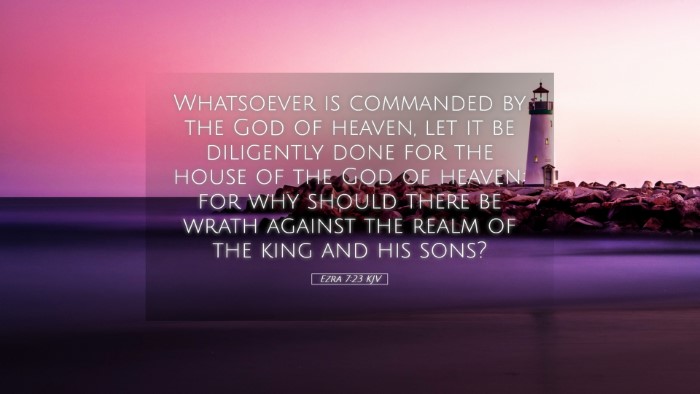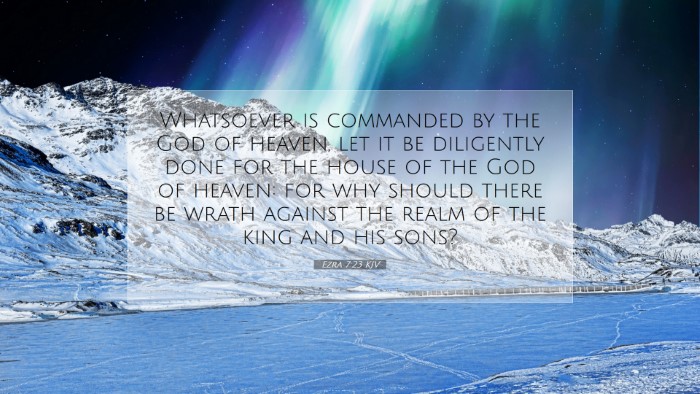Old Testament
Genesis Exodus Leviticus Numbers Deuteronomy Joshua Judges Ruth 1 Samuel 2 Samuel 1 Kings 2 Kings 1 Chronicles 2 Chronicles Ezra Nehemiah Esther Job Psalms Proverbs Ecclesiastes Song of Solomon Isaiah Jeremiah Lamentations Ezekiel Daniel Hosea Joel Amos Obadiah Jonah Micah Nahum Habakkuk Zephaniah Haggai Zechariah MalachiEzra 7:23
Ezra 7:23 KJV
Whatsoever is commanded by the God of heaven, let it be diligently done for the house of the God of heaven: for why should there be wrath against the realm of the king and his sons?
Ezra 7:23 Bible Commentary
Commentary on Ezra 7:23
Verse Reference: Ezra 7:23
“Whatsoever is commanded by the God of heaven, let it be done diligently for the house of the God of heaven; for why should there be wrath against the realm of the king and his sons?”
Introduction
The verse from Ezra 7:23 serves as a significant reminder of the centrality of God’s commandments in the life of the faithful. This passage captures Ezra's commitment to uphold divine decrees, which in turn illustrates the importance of fulfilling God’s will in communal and personal worship. This commentary will synthesize insights gathered from respected public domain theologians such as Matthew Henry, Albert Barnes, and Adam Clarke, with the focus on understanding its historical context and theological implications.
Contextual Background
Ezra, a scribe and priest, played a vital role in the restoration of the Jewish community after the Babylonian exile. His mission was not only to lead a group of exiles back to Jerusalem but also to re-establish the practice of the Law among the people. The quote reflects the directive given to him, emphasizing a sense of divine order and authority over civil governance.
As Barnes notes, Ezra was tasked with bringing back treasures from Babylon to support the temple. The emphasis on diligent observance of God’s regulations underscores that their restoration was not merely economic but spiritual in nature—restoring Israel’s identity in covenant with God.
The Command of God
Matthew Henry points out that “whatsoever is commanded by the God of heaven” highlights the universality and authority of God's commands. This phrase serves as a reminder that God's authority transcends earthly powers. This recognizes that every decree pertaining to worship must be executed with care and reverence.
- Theological Authority: The use of “God of heaven” establishes divine ownership over the temple and its operations.
- Responsibility of Leadership: Ezra's role exhibits the responsibility that comes with spiritual leadership in ensuring that God’s commands are honored.
Diligent Execution
The call to “let it be done diligently” expresses the necessity of commitment and earnestness in worship and obedience. Clarke elaborates on this by suggesting that diligence in following God's directives is protective, as neglect could invoke divine wrath. Proper worship safeguards the community’s wellbeing and the favor of God.
- The Importance of Diligence: Diligence is not merely about being busy; it is reflective of one’s heart and attitude towards God’s commands.
- Implication for Worship: The acknowledgment of consequences—the potential for God’s wrath—suggests a communal obligation to live righteously and in accordance with divine instruction.
The Wrath of God
The final part of the verse warns against provoking “wrath against the realm of the king and his sons.” This aspect is crucial, for it communicates the communal and societal stakes involved in the observance of God’s laws. Henry emphasizes that the kingdom’s integrity and well-being are tied to their faithfulness to God. The understanding of God's wrath is often neglected in contemporary discourse but remains important, serving as a sobering reminder of the implications of our actions.
- Interconnectedness of Society: Ezra acknowledges that the faithfulness of the people can directly affect not just their lives, but also their leaders and the stability of the nation.
- God's Sovereignty: This statement reflects the belief that God’s governance and the earthly rulers' success are intertwined, reinforcing the call for righteousness.
Conclusion
In summary, Ezra 7:23 serves as a potent exhortation for both personal and communal life among believers. The verse stands as a foundational reminder of the necessity of aligning our actions with the divine will, demonstrating diligent obedience, and remaining aware of the implications of disobedience. As Matthew Henry poignantly states, true worship must involve a heart attuned to the holiness and grandeur of God, ensuring that all actions taken in His name reflect His glory.
Pastors, students, theologians, and Bible scholars can extract not only a historical lesson from this text but also a profound spiritual insight that calls for introspection about the ways they honor God in their lives and ministries.


